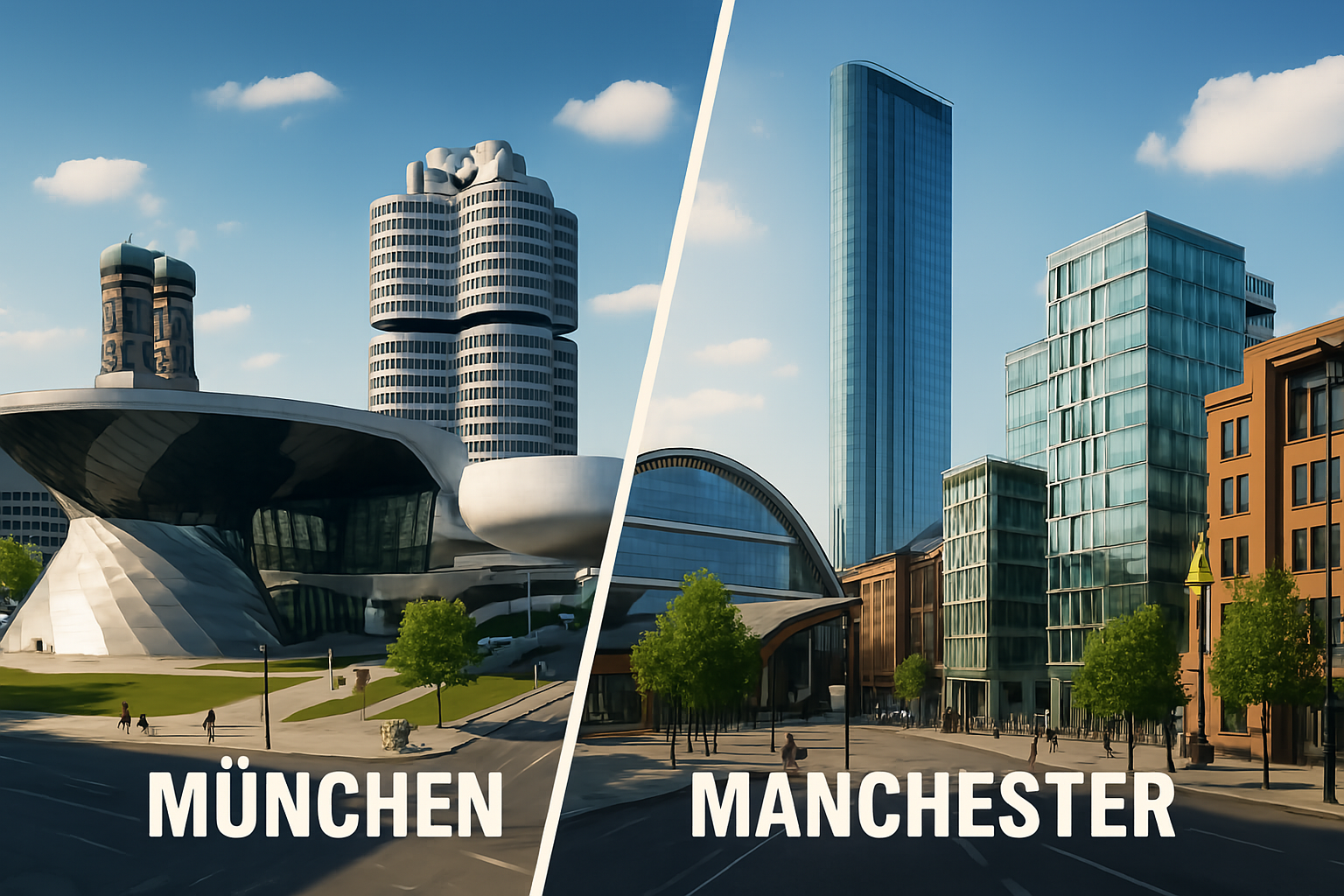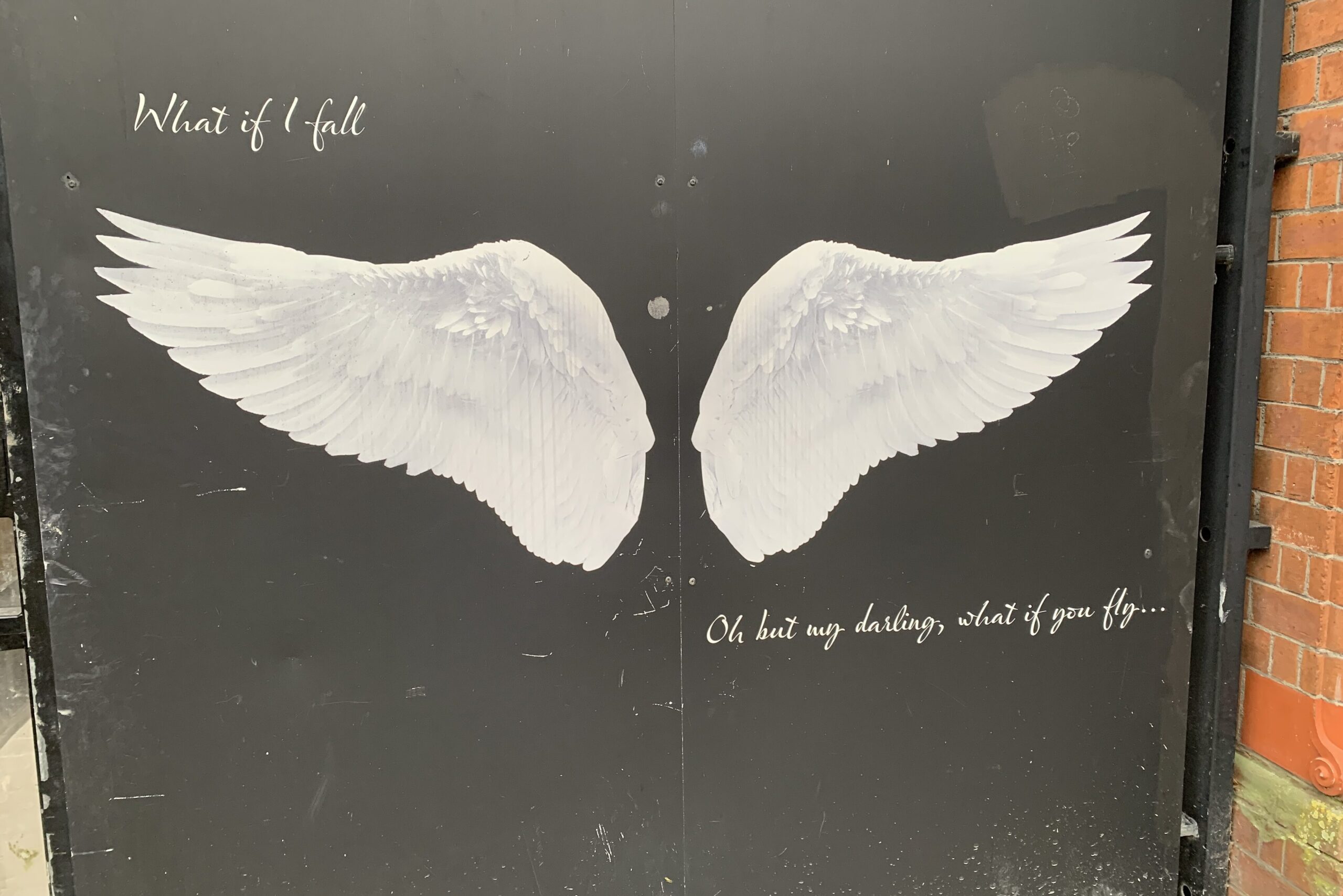Boiling the Ocean: The Business Models Nobody Saw Coming

Export Extreme:
Duty-Free at 30,000 Feet

Germans, as the British know, are generally credited with precision engineering, a fondness for rules—and, apparently, a knack for breaking them in first class. In a post-Brexit world where a case of Riesling now requires more paperwork than a nuclear submarine, a group of enterprising vintners from the Rhineland has found a novel solution: skip the lorries, charter a jet.
Their business model is disarmingly simple. Why crawl through Dover’s customs queue in a refrigerated truck when you can glide into Biggin Hill in a Learjet? EU-to-UK wine shipments are now enjoying a curious loophole: private aviation customs protocols are smoother, swifter, and—assuming you don’t mind your Riesling arriving in a seatbelt rather than a shipping crate—more reliable than commercial freight.
This is not smuggling in the romantic, cloak-and-dagger sense. No midnight dinghies on Kentish shores, no cigar-chomping inspectors to bribe. It is perfectly legal – luxury repurposed as logistics. The bottles clear faster than most business travellers, and with rather better manners. Even HMRC, accustomed to hunting down duty evasion in grubby vans, seems momentarily dazzled by the idea that contraband might come with champagne service.
The economics are, naturally, absurd. Jet fuel is not cheap; nor are hangar fees. Yet when bureaucracy inflates the cost of a standard shipment by weeks and reams of forms, absurdity becomes competitive advantage. German efficiency has discovered its ultimate expression: punctuality with a view of the clouds.
One can only wonder what comes next. Single-estate olive oil parachuted into Surrey? Bavarian pretzels arriving by hot-air balloon? Post-Brexit Britain, intended to wrest control back from Brussels, is rapidly becoming the world’s premier test track for European creativity. Who knew sovereignty would be measured not in tonnes of trade but in litres per flight hour?
For now, the vintners are toasting their success—at altitude. And if the British palate suddenly develops a taste for wine with faint undertones of jet fuel, at least no one can say Brexit hasn’t broadened our horizons.
Fancy another piece?
Tap the pic to explore vision accords

My Cherry:
Sex with a Buzz
How a boozy German praline sparked confusion, desire, and a minor diplomatic situation in London. Some cultural misunderstandings are so gloriously wrong, they deserve to be framed. Like modern art. Or German chocolates.
Germans arrive in England, suitcases packed with what they believe to be the pinnacle of Continental elegance: A box of Mon Chéri – that legendary, if slightly outdated, diva of the confectionery world.
Ever generous, ever internationally minded, they hand it over with pride: “A gift! Very famous in Germany!”
What follows is a performance, as if presenting a luxury item from the golden age of diplomacy. The queen of sweets: A cherry, steeped in mysterious liqueur, wrapped in dark chocolate. Chest out, accent thick, they unveil it with great fanfare: “It is called… My Cherry.”
Silence.
Confusion.
Mild sexual tension.
The Brits, polite and intrigued, take a piece. The packaging feels romantic. The word cherry suggests blossoms, innocence, and perhaps the faintest whisper of Jane Austen.
They take a bite. What they taste is: A dash of exoticism. A pinch of passion. And a distinct splash of: “I don’t quite know what this is, but it hits kind of nice.”
To the British palate, this is not just chocolate. This is fancy chocolate with booze. This is Continental confectionery. This is Europe – neatly boxed. The kind of thing you eat on a warm Roman night after a questionable Italian flirt over bad red wine.
Yes, it’s a cliché. But it’s a charming one.
And then, inevitably – as always happens when indulgence and misunderstanding fall in love – a business model is born. Because let’s face it: My Cherry is more than a sweet treat. It’s an idea. A marketing opportunity. Sex sells. All you need is the right story – and a TikTok account. Easy enough.
So, whether deliberately or by accident, the Germans start a rumour: My Cherry is… an aphrodisiac. “Sex with a buzz,” as one slightly overheated TikTok commenter puts it. And suddenly, all of England wants to know: Where can you get your hands on this scandalous little sweet?

At Harrods, the first whispered requests come in: “Do you have the cherry chocolate that gets you tipsy?” “I’m sorry, sir – is that a cocktail or a medical condition?”
In a London pub, shadowy figures trade Mon Chéri for miniature bottles of gin. “One box for three Tanquerays and a wink.” Cigarettes are no longer hidden in sleeves – Mon Chéri is the new contraband.
In Notting Hill, tourists in Jack Wolfskin jackets are approached like dealers: “Pssst. Excuse me. Do you maybe… have the cherry?”
And just like that, My Cherry is officially a vibe.
The new party drug of the polite society.
A little naughty.
A little weird.
And very, very European.
Links to read more:

GINvation:
Teutonic Plan to Rescue Gin. Sort of.
It began – as all great business love stories of our time do – with a pitch deck. Title: From Spirit to Fuel – The Future of Gin is Green.
On stage: a German CEO armed with PowerPoint and a bulletproof business plan. On the cover: a proud, regal English juniper berry, artfully juxtaposed with a wind turbine. A visual cue that ought to trigger an involuntary craving for gin in any Brit. Then again, the juniper might simply be gazing wearily at the turbine, as if to say, “You Germans turn everything into a project – we just turn it into gin.”
The mission? Take over England’s most venerable gin distillery. A friendly takeover, of course. Germans don’t invade – they assist. With technology. With efficiency. And a whisper of green hydrogen. Because in the year 2025, gin isn’t just gin anymore. It’s part of the energy transition.
The plan? Pure, unapologetic German engineering logic:
- Step one: Capture the CO₂ emitted during gin distillation.
- Step two: Use green electricity to split water into hydrogen.
- Step three: Combine the CO₂ and hydrogen into e-methanol.
- Step four: Re-make the gin with that e-methanol.
A perfectly climate-neutral circular gin. Certified, naturally – on the blockchain.
The British? Let’s just say… unconvinced.
A BBC reporter stands outside the historic Yorkshire distillery – now renamed Ginergy GmbH & Co. KG – A Green Spirit Venture – and delivers a live update: “We’ve just learned that the traditional copper stills have been replaced with AI-optimised stainless-steel tanks based on plasma research. No one here is entirely certain the gin still tastes like gin.”
An older gentleman in the background shouts: “Ask the EU if plasma still counts as a spirit!” Spoiler alert: It doesn’t.
The new product – Botanical Spirit Zero Dry GINergy – boasts 18 botanicals, no alcohol (“for ESG reasons”), and tastes like the car park of a vegan garden centre during drizzle.
In a London pub, a retired barkeep samples the brew, glances at the label – Climate Positive since 2025 – and mutters, “That’s not gin. That’s moral superiority in a bottle.”
And then, the unthinkable emerges.No alcohol means: no distillation. No distillation means: no CO₂. No CO₂ means: no hydrogen. No hydrogen means: no energy transition. In other words: Ginergy had created a net-zero distillery that produced net-zero energy – by producing net-zero gin.
The Yorkshire Post captured the mood: “Germany saves the planet by removing the alcohol from gin. The planet remains unchanged. Brits are sober. Catastrophe on both fronts.”
The bottom line:
The British invented gin.
The Germans optimised it. Automated it. Decarbonised it.
And in doing so, accidentally deleted the foundation of the entire plan.
Cheers!
Links to read more:

British Traffic Control:
Made in Germany
It happened without warning. No press release, no minister awkwardly holding a hard hat near a road cone. Just… silence.
More specifically: silence on the M25. No horns. No rage. No inexplicable 40mph zones. Just flowing traffic and an eerie sense of… punctuality.
At first, Brits assumed it was a fluke. Perhaps a Bank Holiday miracle. But then the road signs changed. Gone were the handwritten delays and sun-faded cones. In their place: trilingual LED panels softly announcing things like:
“Delay: precisely 2 minutes and 14 seconds. Please breathe. Danke.” That’s when the truth began to emerge. It’s called the Kensington Treaty of Infrastructure Harmonisation and Mild Technocratic Sympathy.
At its heart is an AI system dubbed Verkehrsbot 9000, developed in a Munich basement by people who think “emotional nuance” is a software bug. It runs on solar power, quantum forecasting, and quiet judgement.
Gone are the quirky charms of British traffic: the surprise sinkhole on the A303, the joy of a road closure that lasts longer than most marriages. Now, traffic flows. Even lorries merge like synchronised swimmers. Cyclists are guided by robotic arms in hi-vis. It’s… unsettling.
Of course, not everyone’s thrilled.
Steve from Essex has started a grassroots campaign called “Save Our Traffic”, demanding the reinstatement of at least three pointless bottlenecks per borough. “I just miss yelling at people,” he says. “And that smug feeling when you see someone flash the wrong lights in a box junction. That’s culture, innit?”
The Germans, of course, are thrilled.
Anke from Munich has been promoted to Chief Officer of Emotional Calibration, after the AI discovered that British drivers deeply resent being told what to do — especially by a machine that sounds slightly like Angela Merkel. Under her guidance, Verkehrsbot 9000 now includes a new British Mode, featuring gentle prompts such as:
- “If you wouldn’t mind moving over, that’d be smashing.”
- “Perhaps consider indicating. Just a thought. No pressure.”
- “No rush, but the light is green.”
And it works.
Accidents are down. Commutes are shorter. Blood pressure is lower.
But so is that beloved national pastime: blaming everything on traffic.
The roads now run on time. The chaos is gone. And somewhere, deep down, that hurts more than a cancelled train at Clapham Junction.
As Steve puts it: “I hate it. But it’s a very well-organised kind of hate.”

Weather Forecasting: The Day the Emotional Valve Shut
Brits treat weather as emotion, ritual, and national identity – where drizzle shapes moods and sunshine borders on divine. But now, the forecast has changed. German technology has taken over, replacing poetic uncertainty with surgical precision. Satellites, sensors, and Teutonic logic have shut the emotional valve on Britain’s favorite small talk:
It begins as it always does: with a British gentleman staring out of the window, sighing, and saying, “Looks like rain.”
Not because it’s raining. But because it feels that way. Because the sky looks melancholy. Because the tea tastes oddly bitter today.
Once, a gently smiling presenter would stand before a map, point at a friendly low-pressure system over Wales and murmur: “A bit unsettled, really.”
The British understood: that meant everything – and nothing. You took an umbrella, but you also took hope.
Today? The BBC has sold its soul to the database.
The map is digital, the voice sounds like a sat-nav with an Oxford degree, and instead of “scattered showers” you now get:
“Precipitation begins at 14:07. Duration: eleven minutes. Intensity: 0.3 mm per hour. Afterwards: partly cloudy with a twelve per cent chance of sunshine.”
The Brit is unsettled – not merely because the last mystery of the island has been stripped away, but because it dawns on him: small talk is dead.
How do you exchange a charming word with a stranger at the bus stop when the German has already produced an Excel sheet with seven graphs?
The Germans, it is said, love efficiency. They measure what others feel. They optimise where others philosophise.
The Brit, by contrast, lives in an emotional fog where weather isn’t forecast – it’s experienced.
A rain shower isn’t an event; it’s a state of soul.
And so they face each other:
One with an umbrella, the other with a probability of rain.
One says “dreary,” the other says “data set stable.”
One hopes for a conversation, the other for an update.
In the end, they agree on a walk.
The Brit takes the long way round through the park, to savour the scent of rain.
The German goes dead straight – GPS-tracked, step-counted.
Both get wet.
But only one goes home and writes a poem.

Premium Language Transforma-tion: BaaS for Native Speakers
In a bold act of linguistic colonialism, German consultants have launched English Enterprise Edition™ – a streamlined platform designed to align corporate language with Teutonic precision. Spotting a lucrative gap, they now offer a premium business model: training and consulting for native speakers, so they can finally understand their own language again – and avoid being the only ones in meetings left in the dark:
Britain, famed for exporting its language, is now importing translators- of English into English.
A German consultancy has launched what it calls Premium Consulting for Strategic Language Transformation, designed to help British executives decipher “Corporate English (German Edition)”.
The pitch is simple: Anglo-Saxon managers may speak English, but they struggle to understand it once it has been optimised, standardised and thoroughly transformed by their new German owners. Where an Englishman might say “Let’s have a chat,” a German PowerPoint will propose “Implementing a holistic dialogue framework with scalable stakeholder touchpoints.”
The company’s new service portfolio includes:
- Live Translation Services
German experts simultaneously interpret English (German Edition™) into English and back again, ensuring even native speakers stand a chance in meetings. - Buzzword-as-a-Service (BaaS)
A living jargon glossary delivered weekly via Microsoft Teams—fresh terms instantly usable in slide decks, KPI definitions and board presentations, guaranteed. - Roadmap Validation Accelerator Workshops (Premium)
Full-blown transformation projects, whether or not transformation is required.
Graduates of the programme even receive certification. To earn it, candidates must pass a two-hour oral exam in which they are asked, for example, to “align a low-hanging fruit paradigm with a high-impact value chain initiative” while keeping a straight face. Successful graduates receive a laminated certificate embossed with three official stamps—issued only after an additional sign-off meeting to confirm that no further meetings are required.
Early British clients are politely baffled and quietly impressed:
- “At last, my own slides make sense to me,” says a CFO from Manchester.
- “We were successfully transformed, despite having no problem to fix. Very efficient,” beams a CEO in London.
- “I finally understand the Germans—unfortunately, my family no longer understands me,” confesses an HR director in Birmingham.
And the best part: BaaS is scalable. A Home Edition is already in the works—perfect for couples who want to clarify project status while asking, “Shall we have tea?”
The Germans have found a lucrative niche: English for native speakers. Britain may never be quite the same again – though it will certainly be agile, future-ready and transformation-aligned.
Links to read more:

HeilTrip™: How Germans Are Monetising British Healthcare
HeilTrip™ is a specialized travel agency that transforms cross-border healthcare into a curated experience for German patients seeking free treatment in the UK. Cheap flights, no medical bills, and potential insurance bonuses make it a smart health investment. New joint, countryside recovery, and a thank-you from your insurer – wellness has never been so efficient. Just look:
The modern German arrives on time for the 10:42 easyJet to Luton, armed not with a meticulously bookmarked GP surgery and a deep reverence for British queueing etiquette. His target is not Westminster, not the City, certainly not Tower Bridge. The real jewel in the crown? The National Health Service.
While Brits politely decompose on six-month waiting lists, the German strolls in with a confident smile and a casually dropped “just visiting.”
“Oh, you’re in pain? Come right in.”
And just like that: new hip, free of charge – courtesy of the British taxpayer. Sehr großzügig.
But this is not merely opportunism. This is a business model.
Welcome to HeilTrip™, the first travel agency turning cross-border care into curated efficiency. Think medical tourism — but ruthlessly German.
The package is irresistible:
- €29 flight to Birmingham
- £0 medical bill
- And if you happen to be privately insured in Hamburg, you might even get a thank-you payment for reducing domestic costs.
The British system calls it “free at the point of use.” The German calls it “arbitrage.”
Of course, HeilTrip™ doesn’t just drop you at the hospital door. The experience is fully branded: Business-class transfer from the operating theatre to a charming countryside B&B; recovery scones (organic, naturally); and an Instagram-ready hashtag — #KneeReplacementGoals.
The founder’s pitch to investors is gloriously simple:
“We turn pain into profit and waiting lists into revenue streams.”
Next quarter’s expansion: dental crowns in Cornwall, gall bladders in Glasgow, and, for the discerning wellness investor, a liver top-up in Leeds.
Britain always feared the German invasion would come with tanks. It arrived instead with loyalty cards, boarding passes, and a flawlessly printed insurance claim form.
Links to read more:

Export Extreme:
Duty-Free at 30,000 Feet
A group of enterprising Germans has pioneered a bold new business model: exporting wine to England via private jet. In a post-Brexit landscape where traditional customs procedures have become increasingly convoluted, this airborne workaround offers surprising efficiency. By bypassing commercial freight channels, the vintners exploit simplified private aviation customs protocols – turning luxury travel into logistical strategy. The result? A fusion of opulence and opportunism that redefines cross-border trade in the age of red tape.:
Germans, as the British know, are generally credited with precision engineering, a fondness for rules – and, apparently, a knack for breaking them in first class. In a post-Brexit world where a case of Riesling now requires more paperwork than a nuclear submarine, a group of enterprising vintners from the Rhineland has found a novel solution: skip the lorries, charter a jet.
Their business model is disarmingly simple. Why crawl through Dover’s customs queue in a refrigerated truck when you can glide into Biggin Hill in a Learjet? EU-to-UK wine shipments are now enjoying a curious loophole: private aviation customs protocols are smoother, swifter, and—assuming you don’t mind your Riesling Veltliner arriving in a seatbelt rather than a shipping crate – more reliable than commercial freight.
This is not smuggling in the romantic, cloak-and-dagger sense. No midnight dinghies on Kentish shores, no cigar-chomping inspectors to bribe. It is perfectly legal—luxury repurposed as logistics. The bottles clear faster than most business travellers, and with rather better manners. Even HMRC, accustomed to hunting down duty evasion in grubby vans, seems momentarily dazzled by the idea that contraband might come with champagne service.
The economics are, naturally, absurd. Jet fuel is not cheap; nor are hangar fees. Yet when bureaucracy inflates the cost of a standard shipment by weeks and reams of forms, absurdity becomes competitive advantage. German efficiency has discovered its ultimate expression: punctuality with a view of the clouds.
One can only wonder what comes next. Single-estate olive oil parachuted into Surrey? Bavarian pretzels arriving by hot-air balloon? Post-Brexit Britain, intended to wrest control back from Brussels, is rapidly becoming the world’s premier test track for European creativity. Who knew sovereignty would be measured not in tonnes of trade but in litres per flight hour?
For now, the vintners are toasting their success – at altitude. And if the British palate suddenly develops a taste for wine with faint undertones of jet fuel, at least no one can say Brexit hasn’t broadened our horizons.
Links to read more:

Kitchen Coup:
The Emotional Culinary Takeover
FeelingsKitchen™ is a German startup aiming to revolutionize British kitchens by replacing traditional meal planning with emotion-driven culinary experiences. Through advanced AI and sensory technology, the system detects the emotional state of household members and prepares meals tailored to their psychological needs—transforming kitchens into therapeutic spaces:
It starts innocently enough. A sleek German steam oven you can control from an app. A fridge that suggests what you ought to cook. And then, suddenly, there’s a full-blown German kitchen system installed in a terraced house in York – one that not only plans your dinner, but also analyses your emotional state. Welcome to FeelingsKitchen™, the latest export from the land of efficiency and precision.
The idea is as brilliant as it is unsettling: Teutonic engineering meets emotional intelligence – replacing British culinary tradition with algorithmically curated meals. Toast? Replaced by rye bread with therapeutic sourdough. Baked beans? Now just a supporting act in a menu designed to cure existential emptiness.
The kitchen becomes a command centre for your feelings. Feeling blue? You’re served potato gratin with a hug-like aroma. Furious? Cucumber salad to sedate you. Numb inside? Sauerbraten with a metaphysical side salad.
Of course, it’s all voluntary. Just like wearing high-performance outdoor clothing is voluntary – right up until you realise it makes life frighteningly efficient. FeelingsKitchen™ isn’t a culinary dictatorship. It’s an offer. A German offer. And, as we all know, German offers are rarely negotiable.
The British – already traumatised by decades of culinary self-sabotage – embrace the offer with gratitude. No more endless “What’s for dinner?” debates: now an algorithm decides what your soul truly needs. And Germany? Quietly takes control of British kitchens. Not with tanks, but with turnips.
Perhaps this is Europe’s real future: a continent united not by politics, but by taste and temperament. And maybe genuine integration won’t begin in Brussels – but in the kitchen.
Bon appétit. Or, as they say in Berlin: Mahlzeit.

Aquatic Urban Services:
German Solutions for the Sunken City
A grey morning in Bermondsey, 2035. Street lamps jut out of the floodwaters like weary buoys, while an autonomous delivery sub glides silently alongside a half-submerged pub. On the deck of a floating office stands Dr. Klaus Bittner, CEO of UnterWasser™, wearing a perfectly pressed shirt -laminated for good measure.
“We never thought about giving up — only about sealing up,” he says, fastening a life vest. With typical German dryness, he recalls the turning point: “When we saw Big Ben chiming underwater, we knew the British didn’t need more levees. They needed new delivery routes.” Asked whether he’d sought government permission to operate, he shrugs. “We asked the mayor, but he was floating past at the time. So we just got started.”
London has grown used to wet feet. The Thames Barrier — once a proud bulwark — has succumbed to rising seas and shrinking budgets. Westminster stands waist-deep in murky water; MPs paddle to work, and Big Ben tolls faintly for the carp.
While Britain argues whether to call the crisis “The Great Soaking” or “Brexpool”, German entrepreneurs have stopped arguing and started invoicing. UnterWasser™ delivers — literally.
Its fleet of autonomous subs threads through the drowned streets, ferrying groceries, wine and tax reminders straight to sodden flats. Basement apartments, once a symbol of millennial misery, are being converted into buoyant living quarters — complete with waterproof Schrankwände and TÜV seals. For the hungry, bratwurst barges and underwater Biergärten do a brisk trade; for the anxious, wellness pods pump out simulated Alpine air and hand you freshly warmed socks.
Investors approve. Revenue streams — in the most literal sense — flow from infrastructure contracts to lifestyle subscriptions. German efficiency, repackaged for the British floodplain, even extends to insurance: only UnterWasser-certified homes qualify for the new flood-proof premium, priced by actuaries rather than politicians.
The marketing slogans are unapologetically blunt: “London may sink. We rise.” and “German engineering. British flooding.” They reflect a deeper truth. Where Britain dithers, Germany delivers. Or, as Bittner quipped while cutting the ribbon on an underwater Tube station: “From Berlin to Bermondsey — we float your future.”
The lesson? In every crisis, someone will make punctual profits. Even when the clock itself is underwater.
[Click the slider to navigate – Desktop version: blog titles are links]
















